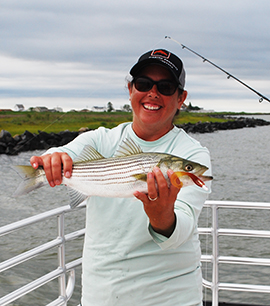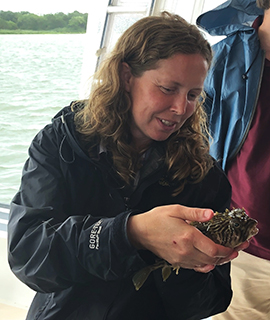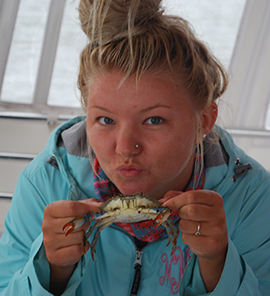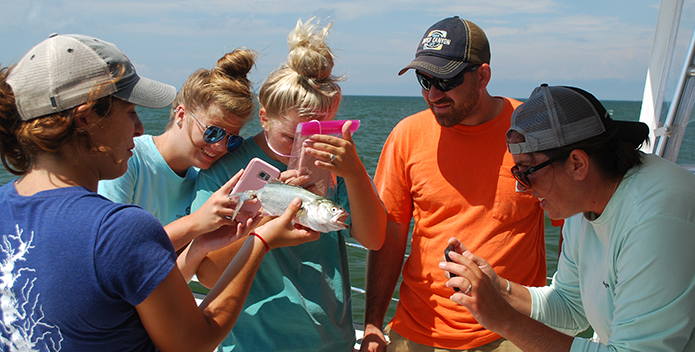Last July, 10 farmers from the base of Virginia's Blue Ridge mountains in Bedford County spent an eye-opening weekend on islands in the middle of the Chesapeake Bay during CBF's latest Farmers to the Bay excursion. While there, they surveyed crabs and fish, met with Tangier watermen, and discussed ways farmers are helping to restore local waterways and the Bay.

Farmer Beth Bays proudly holds her rockfish.
Chris Moore/CBF Staff
"These experiences create a connection between what happens on the farm and the health of waters downstream and in the Bay," said Matt Kowalski, CBF's Virginia Watershed Restoration Scientist. "It's educational and lot of fun."
For Beth Bays, this was her the first trip out on the Bay. Beth and her husband run a farm in Huddleston that raises beef cattle and grows hay, wheat, and soybeans. On the islands, she rose at sunrise on Sunday to land the group's only striped bass of the day. "The whole trip was one of the most incredible experiences ever," she said." I really fell in love with the water, the islands, and the people."

Elizabeth Akinhead discovers a pufferfish.
Matt Akenhead
With support from federal cost-share programs, Bays has already implemented conservation practices on her farm such as fencing cattle out of streams. "I saw how what I do on the farm affects an ecosystem hundreds of miles away," she said. "Not only do these practices benefit the Bay, they also improve soil quality and our bottom line."
Matt Akenhead and his wife Elizabeth raise sheep in the town of Bedford, grazing many of them around the town's solar farm. Out on the islands, Matt was fascinated to learn that support for farm conservation programs is one of the most cost-effective ways to restore the Bay. "At five hours away, I'm not always thinking about how our sheep might affect the Bay," he said. "On the island we talked about how the fastest and most economical way to reduce pollution is by addressing agriculture. That gives us a better return on our money spent."

Madison Meador poses with a blue crab.
Chris Moore/CBF Staff
"The more we can do for clean water, the better," he continued. "We're not just tearing everything up. We're thinking about how to feed the planet, take care of the environment, and lose as little money as possible."
Madison Meador works for the Farm Service Agency and pitches in with her father on the family farm, a cow-calf operation. For Madison, it was her first time on a boat in the Bay. "I'm used to mountains and land. To just look out and only see water—wow, it was awesome," she said.
Madison said that farmers really identify with the watermen who earn their livelihoods from the Bay's crabs, oysters, and fish. "It's all a risk. We are all just trying to make a living with nature—that's how I figure it," she said. "What we do as farmers all ties in."




